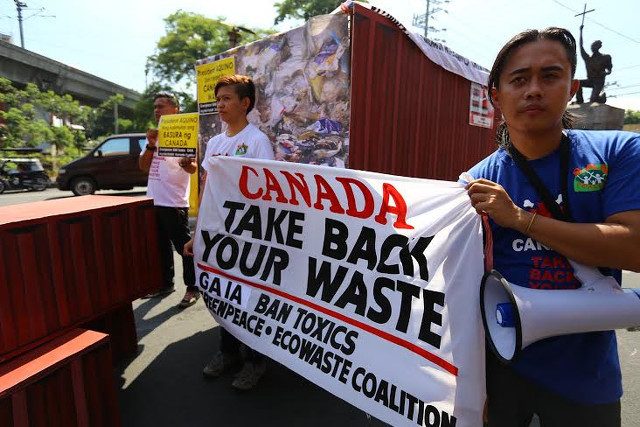SUMMARY
This is AI generated summarization, which may have errors. For context, always refer to the full article.

MANILA, Philippines – The Department of Foreign Affairs (DFA) is not fighting hard enough for the return of stranded illegal garbage to Canada, Senator Francis “Chiz” Escudero said on Wednesday, September 9.
“Canada was treated with kid gloves. Dapat mas matindi at mas mabigat ang posisyon natin laban dito (Our position against it should have been stronger),” he said at a Senate hearing which he presided as chair of the Senate Committee on Environment and Natural Resources.
The DFA has so far sent 3 diplomatic notes to the Canadian government expressing its “objection” to the presence of 55 container vans of garbage smuggled into the Philippines from Canada.
These notes do not mention the second batch of container vans discovered, numbering 48.
The diplomatic notes also requested the Canadian government’s assistance in the “expeditious return of containers to the port of origin at no cost to the government.”
Escudero wondered why the notes did not pursue or question explanations made by Canada as to why it could not ship back the garbage.
Canada, through its ambassador to the Philippines Neil Reeder, has consistently stated that it has “has no domestic or international authority to compel the shipper to return the shipment to Canada.”
“When Canada said they don’t have laws they can use to order their local exporter to take the trash back, we didn’t force the issue,” Escudero said in Filipino.
Other senators present, Loren Legarda and JV Ejercito, emphasized that the re-exportation of the garbage back to Canada is “the only option.”
“If the option to bring back the waste to Canada is difficult, sorry, but that is the only acceptable option,” said Legarda.
Ejercito, who filed Senate Resolution 1440 calling for the inquiry on the Canadian garbage problem, said he would push for legislation that would regulate the importation of such items.
Int’l law on PH side
Environmentalists have long said that international law is on the side of the Philippines. (READ: Illegal garbage dispute: Why can’t Canada be like Japan?)
Canada, as a signatory to the Basel Convention on Transboundary Movements of Hazardous Wastes, is duty-bound to return the illegal shipments to its own shores.
The Convention is an international treaty seeking to control the movement of garbage from developed countries to developing countries.
Legarda said government agencies should use the Convention to strengthen their position.
“As part of [Canada’s] commitment to the Convention, they should take back their waste. The DFA and the Department of Environment and Natural Resources should maintain their firm stand on the return of the waste, and Canada, either the government or the private firm, should fund it,” she stressed.
Comprehensive study needed
The lawmakers also did not accept the results of a DENR garbage study that concluded the Canadian garbage is “neither toxic nor hazardous.”
This study has been used by the Canadian embassy to justify its request for the garbage to be “processed” in the Philippines.
Environmentalists, however, said that the type of analysis conducted by the DENR is insufficient to prove the garbage is safe.
The type of study, called a Waste Analysis and Characterization Study, only classifies the garbage pieces into types but does not analyze the chemical content of each individual piece of garbage, explained BAN Toxics executive director Richard Gutierrez in a previous interview.
Escudero asked the DENR, DFA and Bureau of Customs to present a “more comprehensive report” on the issue.
The 3 agencies comprise an inter-agency committee tasked to deal with the illegal Canadian trash. The group is led by the DENR.
The 103 container vans of household waste from Canada has been stranded in Philippine ports since 2013. The contents of 26 of them have already been disposed of in a private landfill in Tarlac.
Local government units with landfills such as Tarlac, Navotas, and Bulacan have all declared they would block any moves by the national government to dump the Canada garbage in their areas of jurisdiction. – Rappler.com
Add a comment
How does this make you feel?
There are no comments yet. Add your comment to start the conversation.